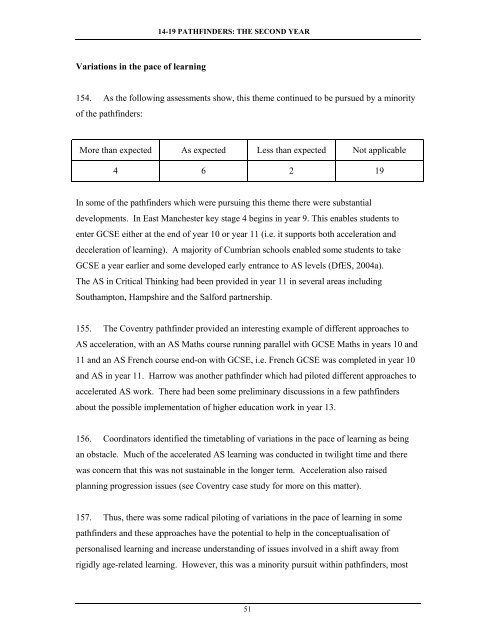Collaborative Approaches to 14-19 Provision - Communities and ...
Collaborative Approaches to 14-19 Provision - Communities and ...
Collaborative Approaches to 14-19 Provision - Communities and ...
- No tags were found...
You also want an ePaper? Increase the reach of your titles
YUMPU automatically turns print PDFs into web optimized ePapers that Google loves.
<strong>14</strong>-<strong>19</strong> PATHFINDERS: THE SECOND YEARVariations in the pace of learning154. As the following assessments show, this theme continued <strong>to</strong> be pursued by a minorityof the pathfinders:More than expected As expected Less than expected Not applicable4 6 2 <strong>19</strong>In some of the pathfinders which were pursuing this theme there were substantialdevelopments. In East Manchester key stage 4 begins in year 9. This enables students <strong>to</strong>enter GCSE either at the end of year 10 or year 11 (i.e. it supports both acceleration <strong>and</strong>deceleration of learning). A majority of Cumbrian schools enabled some students <strong>to</strong> takeGCSE a year earlier <strong>and</strong> some developed early entrance <strong>to</strong> AS levels (DfES, 2004a).The AS in Critical Thinking had been provided in year 11 in several areas includingSouthamp<strong>to</strong>n, Hampshire <strong>and</strong> the Salford partnership.155. The Coventry pathfinder provided an interesting example of different approaches <strong>to</strong>AS acceleration, with an AS Maths course running parallel with GCSE Maths in years 10 <strong>and</strong>11 <strong>and</strong> an AS French course end-on with GCSE, i.e. French GCSE was completed in year 10<strong>and</strong> AS in year 11. Harrow was another pathfinder which had piloted different approaches <strong>to</strong>accelerated AS work. There had been some preliminary discussions in a few pathfindersabout the possible implementation of higher education work in year 13.156. Coordina<strong>to</strong>rs identified the timetabling of variations in the pace of learning as beingan obstacle. Much of the accelerated AS learning was conducted in twilight time <strong>and</strong> therewas concern that this was not sustainable in the longer term. Acceleration also raisedplanning progression issues (see Coventry case study for more on this matter).157. Thus, there was some radical piloting of variations in the pace of learning in somepathfinders <strong>and</strong> these approaches have the potential <strong>to</strong> help in the conceptualisation ofpersonalised learning <strong>and</strong> increase underst<strong>and</strong>ing of issues involved in a shift away fromrigidly age-related learning. However, this was a minority pursuit within pathfinders, most51
















